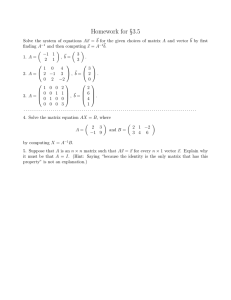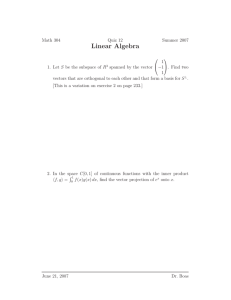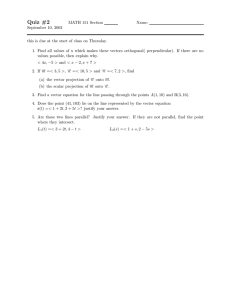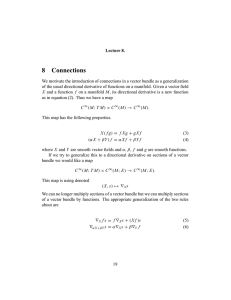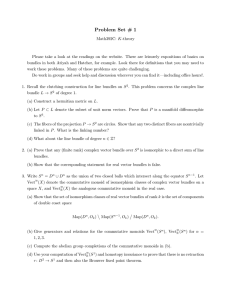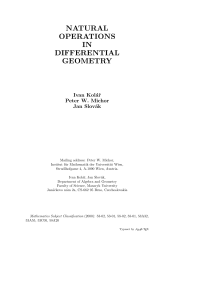7
advertisement
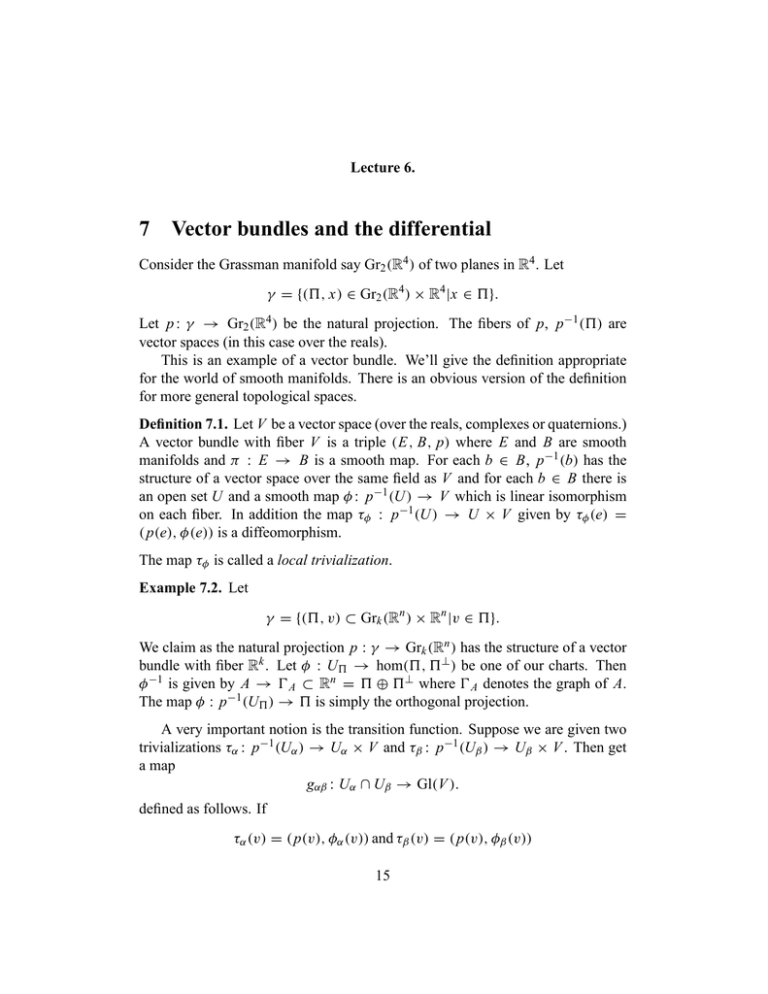
Lecture 6.
7
Vector bundles and the differential
Consider the Grassman manifold say Gr2 (R4 ) of two planes in R4 . Let
γ = {(�, x ) ∈ Gr2 (R4 ) × R4 |x ∈ �}.
Let p : γ → Gr2 (R4 ) be the natural projection. The fibers of p, p −1 (�) are
vector spaces (in this case over the reals).
This is an example of a vector bundle. We’ll give the definition appropriate
for the world of smooth manifolds. There is an obvious version of the definition
for more general topological spaces.
Definition 7.1. Let V be a vector space (over the reals, complexes or quaternions.)
A vector bundle with fiber V is a triple (E , B, p) where E and B are smooth
manifolds and π : E → B is a smooth map. For each b ∈ B, p −1 (b) has the
structure of a vector space over the same field as V and for each b ∈ B there is
an open set U and a smooth map φ : p −1 (U ) → V which is linear isomorphism
on each fiber. In addition the map τφ : p −1 (U ) → U × V given by τφ (e) =
( p(e), φ (e)) is a diffeomorphism.
The map τφ is called a local trivialization.
Example 7.2. Let
γ = {(�, v) ⊂ Grk (Rn ) × Rn |v ∈ �}.
We claim as the natural projection p : γ → Grk (Rn ) has the structure of a vector
bundle with fiber Rk . Let φ : U� → hom(�, �⊥ ) be one of our charts. Then
φ −1 is given by A → � A ⊂ Rn = � ⊕ �⊥ where � A denotes the graph of A.
The map φ : p −1 (U� ) → � is simply the orthogonal projection.
A very important notion is the transition function. Suppose we are given two
trivializations τα : p −1 (Uα ) → Uα × V and τβ : p −1 (Uβ ) → Uβ × V . Then get
a map
gαβ : Uα ∩ Uβ → Gl(V ).
defined as follows. If
τα (v) = ( p(v), φα (v)) and τβ (v) = ( p(v), φβ (v))
15
then
gαβ ( p(v))φβ (v) = φα (v).
The transition function satisfy the cocycle condition: If we have three trivializa­
tions τα , τβ , τγ over open sets Uα , Uβ , Uγ then for all x ∈ Uα ∩ Uβ ∩ Uγ
gαβ gβγ gγ α = 1
A vector bundle is determined its transition functions and give an open cover
{Uα } and a collection of functions
gαβ : Uα ∩ Uβ → Gl(V ).
satisfying the cocycle condition we can construct a vector bundle.
7.1 New vector bundles from old
We can get new vector bundles from old bundles in a number of ways. Given
p1 : V1 → X and p2 : V2 → X we can take direct (or Whitney) sum to get a
bundle V1 ⊕ V2 → X whose fiber above x is p1−1 (x )⊕ p2−1 (x). Another important
operation is the pullback. Suppose we have p : V → X and f : Y → X a smooth
map. Then we can form a vector bundle over Y as follows. The total space denoted
f ∗ (V ) is:
f ∗ (V ) = {(y, v)| f (y) = p(v)}
and projection
f ∗ ( p)(y, v) = y.
16
